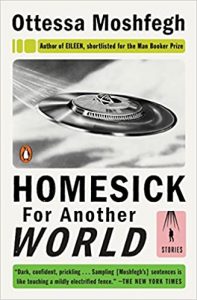Mr. Stevens, being the first-person narrator of this novel, is naturally unreliable; this is exacerbated by the fact that he fails to recognize his own emotions. His emotional state is not completely absent, however, though we are only told about it because another character mentions it to Mr. Stevens. Mr. Stevens is unable to comprehend the human spirit or warmth. This is the root cause of his failure to recognize his love for Ms. Kenton and his failure of moral responsibility.
In the prologue, Mr. Stevens mentions his inability to banter with his newest employer Mr. Farraday. He writes that “I did not take sufficient account of the fact that at that time of the day, what Mr. Farraday enjoys is a conversation of a light-hearted, humorous sort…I must say this business of bantering is not a duty I feel I can ever discharge with enthusiasm.” To his mind, he doesn’t want to banter because he doesn’t know when it will be appropriate to do so with his employer when, in actuality, he doesn’t recognize the spirit in which it is said.
When his father is ill, Mr. Stevens lack of emotional response is apparent to us. Firstly, when he visits his father as he lies sick in bed, he continues to say, “I hope Father is feeling better now…I’m very glad Father is feeling better…I’m glad Father is feeling so much better.” Mr. Stevens never slips and calls him with the familiar word Dad. While he is serving guests at the dinner party, his emotional response to his father’s poor condition is only told to us first by Mr. Cardinal and second by Lord Darlington:
“I say, Stevens, are you all right?”
I smiled again. “Quite all right, thank you, sir.”
“I say, Stevens, are you sure you’re all right there?”
“Perfectly all right, thank you, sir.”
Lord Darlington then approaches Mr. Stevens:
“Stevens, are you all right?”
“Yes, sir. Perfectly.”
“You look as though you’re crying.”
I laughed and taking out a handkerchief, quickly wiped my face. “I’m sorry, sir. The strains of a hard day.”
Mr. Stevens wouldn’t have told us his emotional state if it hadn’t been observed by these two characters. When his father dies later in the evening, Mr. Stevens continues on with his duties, telling Ms. Kenton that “I know my father would have wished me to carry on just now…to do otherwise, I feel, would be to let him down.” Not even his father comes before his duty.
The greatest example of his emotional shortcomings is when he obeys Lord Darlington’s command to fire the two Jewish maids. He doesn’t question this order, not even for a moment. He and Ms. Kenton have an argument:
“Mr. Stevens, I cannot quite believe my ears…I trust them absolutely and indeed they trust me. They have served this house excellently.”
“I am sure that is so, Miss Kenton. However, we must not allow sentiment to creep into our judgement.”
“I am telling you, Mr. Stevens, if you dismiss my girls tomorrow, it will be wrong, a sin as any sin ever was one, and I will not continue to work in such a house.”
“Miss Kenton, let me suggest to you that you are hardly well placed to be passing judgements of such a high and mighty nature…there are many things you and I are simply not in a position to understand…whereas his lordship…is somewhat better placed to judge what is for the best.”
There is a great chasm between Mr. Stevens and his emotions, his blind trust in the “greatness” of Lord Darlington, and his unwillingness even for a moment to think about the situation; if he had acknowledged the moral responsibility he had towards the two Jewish maids, the wrong actions of Lord Darlington would have been prevented. However, Mr. Stevens had no desire to allow his emotions into any facet of his life.
Mr. Stevens is so emotionally stunted that he cannot even offer condolences to Miss Kenton when her aunt dies. He wants to express his sympathy, but he cannot articulate the proper words, and he falls back upon what he knows best—his duty as the butler.
“As a matter of fact, Miss Kenton, I have to say this. I have noticed one or two things have fallen in standard just recently. I do feel you might be a little less complacent as regards new arrivals.”
For a second, Miss Kenton looked confused. Then she turned towards me and a certain strain was visible in her face. “I beg your pardon, Mr. Stevens?”
“For instance, Miss Kenton, although the crockery is being washed to as high a standard as ever, I have noticed it is being replaced on the kitchen shelves in a manner which, while not obviously dangerous, would nevertheless over time result in more breakages than necessary.”
“Is that so, Mr. Stevens?”
“It is not like you to have overlooked such obvious things, Miss Kenton.”
Miss Kenton looked away from me, and again an expression crossed her face as though she were trying to puzzle out something that had quite confused her. She did not look upset so much as she looked weary. Then she closed the sideboard, said: “Please excuse me, Mr. Stevens,” and left the room.
While Mr. Stevens didn’t mean to be so callous to Miss Kenton, this is nevertheless what he does to her. He is blind to his emotions therefore he can’t articulate them, and he fails in this relationship as he does in many other things.
It is only at the very end, after Miss Kenton tells him she loved him, do we hear him admit to his emotional state: “…for it took me a moment or two to fully digest these words of Miss Kenton. Moreover, as you might appreciate, their implications were such as to provoke a certain degree of sorrow within me. Indeed—why should I not admit it? —at that moment, my heart was breaking.” Yet, as the saying goes “too little, too late.” He has lost Miss Kenton and his chance at love.
As he sits on the pier, Mr. Stevens decides to learn bantering as he now realizes “that in bantering lies the key to human warmth.” Perhaps his newfound commitment will help him in making decisions based on his emotions, and he will live a better life than he had been for fifty years. We can only hope that he develops a moral responsibility and is able to create lasting friendships, but who can say what will become of Mr. Stevens?



